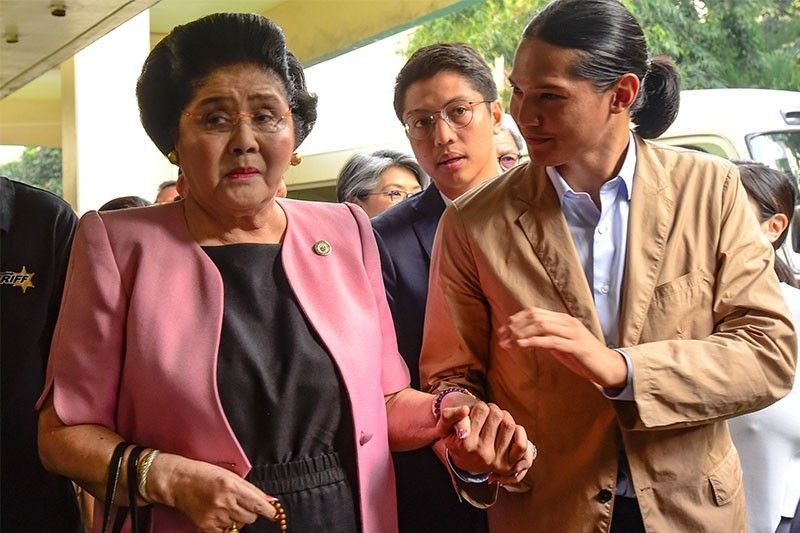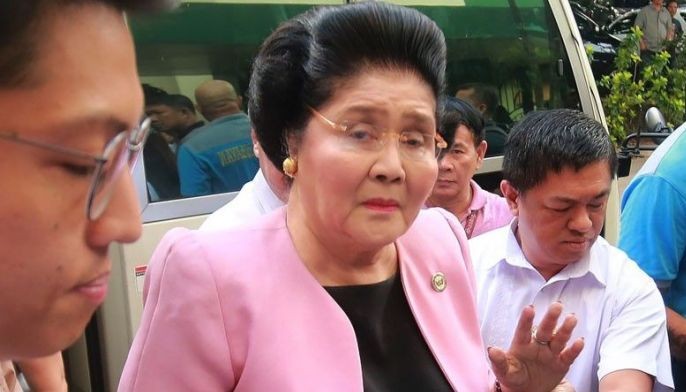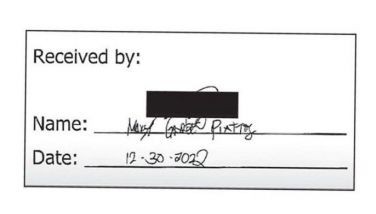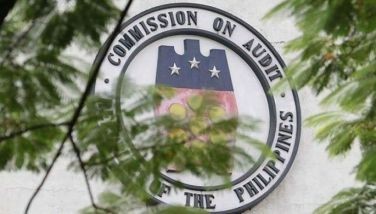Whatever happened to: Graft conviction of Imelda Marcos

MANILA, Philippines (First published on November 9, 2:30 p.m.) — On November 9, 2018, the Sandiganbayan anti-graft court convicted Imelda Marcos, the flamboyant widow of ousted dictator Ferdinand Marcos, of seven counts of graft for creating private foundations in Switzerland when she was a government official.
The former first lady — and, at the time, a district representative of Ilocos Norte — was sentenced to imprisonment of six years and one month to 11 years for each count of graft, which is equivalent to a minimum of 42 years in prison.
She has served none.
Two years later, Imelda Marcos remains free while appealing her graft conviction.
The conviction
Marcos was found guilty of creating private foundations in Switzerland from 1978 to 1984 that allowed her family to funnel illegally amassed government funds during the martial law period. Aside from serving as the governor of Metro Manila, she was also the minister of human settlements and a member of the Interim Batasan Pambansa.
The foundations were identified as Maler Establishment, Trinidad Foundation, Rayby Foundation, Palmy Foundation, Vibur Foundation, Aguamina Foundation and Avertina Foundation.
Sandiganbayan’s Fifth Division also disqualified Marcos, at the time House member for Ilocos Norte’s first district, from holding any public office.
In 2018, the Commission on Human Rights lauded the guilty verdict, calling it “a triumph for the Filipino people, especially for the victims of human rights violations under martial law, in the face of historical revisionism.”
However, the court acquitted Marcos on three counts of violation of Anti-Graft and Corrupt Practices Act in connection with her alleged financial interest in a private local corporation during her government tenure.
The trial of the cases, which began in January 2000, lasted 17 years.
The court’s fifth division also ordered the issuance of a warrant of arrest against Marcos. But a prosecutor said the arrest warrant might not be executed immediately because she could appeal the ruling, which she eventually did.
Oscar Albayalde, the Philippine National Police chief at the time, was criticized for saying the “old age” and health of the Marcos matriarch would be taken into consideration when organizing her possible arrest.
Imelda’s appeal
Less than a month after her graft conviction, Marcos posted on December 5, 2018 a P300,000 bail to enjoy temporary freedom post-conviction. The graft convict also filed another notice of appeal requesting records of her case be forwarded to the Supreme Court for further proceedings.
Under the rules, an accused convicted by the anti-graft court may file a motion for reconsideration seeking a modification or reversal of an unfavourable decision. An accused may also appeal the conviction before the SC but only after filing a required notice of appeal before the Sandiganbayan.
Sandiganbayan eventually allowed Marcos to appeal her graft conviction before the Supreme Court.
What has happened after two years?
The Samahan ng Ex-Detainees Laban sa Detensyon at Aresto (SELDA)—an organization of former political prisoners including martial law victims and survivors—inquired about the status of Marcos’ appeal in a letter addressed to Chief Justice Diosdado Peralta Monday.
“Despite her conviction two years ago, there have been no reports on the Supreme Court’s proceedings and decision on her appeal. We hope that the court will affirm the Sandiganbayan’s decision and pave the way to make Imelda Marcos accountable,” said Danilo dela Fuente, SELDA vice chairperson.
READ: 'More than money, it is about memory': Fight against dictatorship continues for some Marcos victims
Martial law victims’ appeal
The martial law victims also asked the SC to “uphold Sandiganbayan’s decision regarding her conviction, in the interest of justice for all victims during Marcos’ martial law period and accountability.”
Rights group Karapatan said affirming Marcos’ conviction is long overdue.
“This unusual delay is by itself a form of injustice on martial law victims and the millions of Filipinos impoverished by the Marcos regime,” Karapatan secretary general Cristina Palabay told Philstar.com.
Granting her appeal, SELDA said, would send a “highly questionable” message condoning graft and corruption in the country.
“We will never forget how the Marcoses amassed wealth from the nation’s coffers while poverty rate increased, poor Filipinos became even poorer as we bore the fascists attacks during that period,” Dela Fuente said.
Some 70,000 people were imprisoned, 34,000 were tortured and over 3,200 were killed from 1972 to 1981 when martial law was lifted, according to human rights group Amnesty International.
The dictator’s two-decade rule was ended by the 1986 People Power Revolution. The Marcoses fled into exile in Hawaii, where the strongman died three years later.
In 2016, the ousted dictator’s remains were interred at the Libingan ng mga Bayani in Taguig City despite and amid protests.
The case of other elderly detainees
In 2015, the Supreme Court allowed former Sen. Juan Ponce Enrile to post bail for his plunder case on the ground of “advanced age and for health reasons.”
The same doctrine was also cited by Sandiganbayan when it allowed Marcos to post bail on her graft conviction.
“Imelda Marcos was allowed to post bail two years ago, citing health reasons, even though she was able to attend and host parties since that time. Meanwhile, we have sickly and elderly political prisoners who were wrongly accused or convicted of crimes they have not committed, but are still unjustly suffering behind prison bars,” SELDA’s Dela Fuente said.
Among these sick and elderly political prisoners are Frank Fernandez (66) and his wife Cleofe Lagtapon, Moreta and Jesus Alegre (73 and 74), Virginia Villamor (68) and Gerardo dela Peña (81).
“Imelda Marcos’ case is emblematic of the dire state of the justice system in the country—where the filthy rich and those in power are afforded such benefits of being able to party and flaunt their stolen stash from the nation’s coffers, free from arrest despite overwhelming evidence,” Palabay said.
“[Meanwhile], the poor and critics of this administration are being bludgeoned by the legal system in every way possible,” she added. — with reports from The STAR/Elizabeth Marcelo
- Latest
- Trending


































